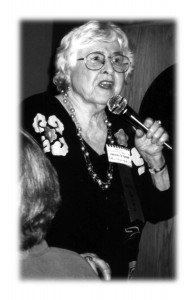A eulogy delivered by Toni Inglis at Venola Schmidt’s memorial service on June 23, 2001, at First Unitarian Church.
The Tuesday after Venola died, former Gov. Ann Richards read the article in the Austin-American Statesman written by reporter Leah Quin. She called me from Washington, DC, and thankfully I had the presence of mind to get a quote from her. “My generation had few mentors—women who taught us what to do. But I had Latane Lambert, Venola Schmidt, Ruth Ellinger and Jean Lee,” Ann said. “Venola was one of those gentle people who loved you in spite of your faults and encouraged you in everything you did.” Once again, Ann Richards hit the nail right squarely on the head.
 It’s a mystery to me how I got to be so lucky to move into a house that was directly across the street from Venola Schmidt. It was 1981. I was 34 years old and had a lot to learn about a lot of things. She was 62 and had a lot to share. Our relationship was ideal because we didn’t have the burden of being family or of living together.
It’s a mystery to me how I got to be so lucky to move into a house that was directly across the street from Venola Schmidt. It was 1981. I was 34 years old and had a lot to learn about a lot of things. She was 62 and had a lot to share. Our relationship was ideal because we didn’t have the burden of being family or of living together.
We recognized right away that we both shared the same core values. The difference was that Venola knew how to channel her passions for the public good; I did not. Venola wasn’t like anyone I had ever met. She was plain-spoken. She meant what she said and she said what she meant. She held the lantern and shined the light in places that were dark to me in the Pre-Venola Era: politics, great painting, great authors, good cooking. She never “taught” me; that wasn’t her style. She just shared with me, and I would learn from her.
During the Venola Era, she never once — not once — commented on external things about me, like what I was wearing or my hair. I once considered renting a clown costume to wear over and see if she would notice. I never did that. When I would pop over, she would look deep inside and know exactly where I was emotionally. That was what was important to Venola. She shared my victories and triumphs, and she shared and made sense of my darkest hours.
In the 20 years and countless hours I spent with Venola I never once heard her say anything petty about anyone. Disagreements with individuals always were issue-based, never personal. Venola often commented how thinking people would naturally disagree and that debate was healthy and productive. Now that’s class in the truest sense.
Venola and I shared a love for writing, and we wrote many a position statement together. The year I moved across the street from her was the year my first published article came out. It was awful. I never showed it to her. The next thing I wanted published I brought over for her to edit. She tore it to shreds, but in the kindest, gentlest way. She had a strict zero-tolerance policy for rambling sentences, big words, or vague meaning.
Within a few years she had me writing as plainly as late President Harry Truman spoke. My happiest moments were when she’d come across a commentary I’d written in the newspaper, call me, and say simply, “That was good. It needed to be said. Thank you.”
Another thing we did really well together was laugh. It’s comforting beyond words to me that in the last few hours of her life we shared a good, hard laugh.
Venola died Saturday night, June 9 around 11 p.m. At 8 p.m., her daughter Sandy and I first learned of her symptoms. We rushed over, and when Venola told me what was going on, I knew she had to go to ER and that she would resist. She told me to call her doctor. I knew that wasn’t necessary, but I sensed Venola wanted to stall a bit and, besides, when Venola tells you to do something, you do it.
Sandy and Venola were sitting on her living room couch, and Sandy was rubbing her back where it hurt. I was sitting across the coffee table from them in my favorite rocker. I dutifully called the medical exchange. A young girl answered and I asked for Dr. Leverich. She sighed and said, “Wait just a minute.” She came back and asked for his first name. I rolled my eyes thinking, “Jeez, how many Dr. Leveriches can there be with this service?” And I asked Venola his first name.
Venola laughed at my reaction and said, “Dick.” I told the girl, “Dick.” Another sigh and, “Wait just a minute.” She came back and said, “I’m sorry. All we have here is a Richard Leverich.”
I found myself in the position of telling this woman who had spent the last 35 years of her life working for access to healthcare for all, “Venola, you’re out of luck. All they have is a Richard Leverich.” And we shared our last good, hard laugh together.
During the Venola Era, it was as if my life map were on the wall, and her hand was over mine connecting the dots. Borrowing from poet W.H. Auden, “(S)he was my North, my South, my East and West.” I don’t know what the Post-Venola Era will be like. But I do know that my world makes a lot more sense and is a bigger, brighter place because of her.

 Austin, Texas
Austin, Texas